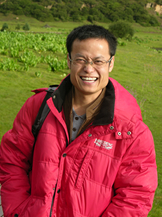People

Quan-Guo Zhang
Professor
Biodiversity, Ecology and Evolution
P:
010-58802308E:
zhangqg@bnu.edu.cn312 Ecology
Educational experience:
BSc: Biology, Beijing Normal University,2001 PhD: Ecology, Beijing Normal University,2005 PhD: Ecology, University of Oxford,2008
Statement:
I use the experimental evolution approach to study how populations adapt to changing environments, in particular how biotic interactions affect abiotic adaptation. The bacteria Escherichia coli and Pseudomonas fluorescens, and their lytic viruses, are the main systems we work with. The major question to be addressed in our lab in the next several years is the temperature dependence of mutation rate and strength of natural selection, which is crucial for explaining the biodiversity patterns on Earth. I am also interested in soil viral ecology, and will do some field and lab experiments to examine their effects on microbial diversity maintenance.
Selected Publication:
1. Zhang, Q.-G. & Buckling, A. (2016). Migration highways and migration barriers created by host–parasite interactions. Ecology Letters, 19, 1479-1485.
2. Zhang, Q.-G. & Buckling, A. (2016). Resource-dependent antagonistic coevolution leads to a new paradox of enrichment. Ecology, 97, 1319-1328.
3. Hao, Y.-Q., Brockhurst, M.A., Petchey, O.L. & Zhang, Q.-G. (2015). Evolutionary rescue can be impeded by temporary environmental amelioration. Ecology Letters, 18, 892-898.
4. Zhang Q.-G. & Buckling A. (2012). Phages limit the evolution of bacterial antibiotic resistance in experimental microcosms. Evolutionary Applications, 5, 575-582. (Recommended by F1000: http:// f1000. com/ prime/718180369).
5. Zhang Q.G., Buckling A. (2011). Antagonistic coevolution limits population persistence of a virus in a thermally deteriorating environment. Ecology Letters, 14, 282-288.
Copyright © 2018 MOE Key Laboratory for Biodiversity Science and Ecological Engineering (FDU& BNU). All rights reserved.
